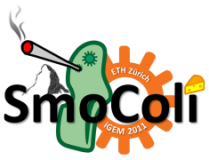Team:ETH Zurich/Biology/Safety
From 2011.igem.org
(Created page with "{{:Team:ETH Zurich/Templates/Header/Biology|currPage=Safety}} __NOTOC__ == Question 1 == '''Would any of your project ideas raise safety issues in terms of: ''' * '''Researcher ...") |
|||
| Line 1: | Line 1: | ||
{{:Team:ETH Zurich/Templates/Header/Biology|currPage=Safety}} | {{:Team:ETH Zurich/Templates/Header/Biology|currPage=Safety}} | ||
| - | |||
== Question 1 == | == Question 1 == | ||
'''Would any of your project ideas raise safety issues in terms of: ''' | '''Would any of your project ideas raise safety issues in terms of: ''' | ||
Revision as of 14:53, 22 August 2011
Question 1
Would any of your project ideas raise safety issues in terms of:
- Researcher safety?
No, the use of certain toxic or carcinogenic chemicals is indispensable in biology lab work. Acetaldehyde is used to turn off our expression system and is a toxic and carcinogenic substance. Normal safety precautions such as wearing gloves, glasses and a lab coat to protect ourselves are implemented. Work with volatile chemicals is performed under a hood in order to prevent inhalation. All lab work is carried out in a S1 lab.
- Public safety or environmental safety?
For our experiments we only use non-pathogenic strains of e.coli and do not transform any harmful genes. No bacteria are released into the environment, all material contaminated with bacteria is autoclaved at 120°C. Harmful chemicals are collected and disposed of, separately. Our system is isolated and has no direct contact with the environment and other organisms. Thus it should not pose a risk to public or environmental safety.
Question 2
Do any of the new BioBrick parts (or devices) that you made this year raise any safety issues? If yes,
- did you document these issues in the Registry?
- how did you manage to handle the safety issue?
- How could other teams learn from your experience?
No, the new BioBrick parts we are making do not raise any safety issues.
Question 3
Is there a local biosafety group, committee, or review board at your institution?
- If yes, what does your local biosafety group think about your project?
- If no, which specific biosafety rules or guidelines do you have to consider in your country?
The security consultant of the D-BSSE department of the ETH stated that there is no general security issue with our project and forwarded us to Professor Sven Panke, for getting his opinion on the safety of our biological system. He did not find any reason for concern in our design.
Question 4
Do you have any other ideas how to deal with safety issues that could be useful for future iGEM competitions? How could parts, devices and systems be made even safer through biosafety engineering?
The release of genetically modified organisms (GMOs) to the environment has to be avoided under all circumstances. Thus strains have to be engineered in an appropriate way. Further lab practices need to be optimized and adapted to recent progress done in science. The generation of knowledge and the responsible and sustainable application of it are crucial for the safety of biologically engineered systems.
Safety considerations in Switzerland and at ETH Zurich
References
[2] [http://www.bafu.admin.ch/biotechnologie/02618/index.html?lang=en Swiss Legal Bases Biotechnology]
[3] [http://www.admin.ch/ch/e/rs/814_911/index.html Swiss Legislature: Release Ordinance, RO / Freisetzungsverordnung, FrSV]
[4] [http://www.admin.ch/ch/d/sr/814_912/index.html Swiss Legislature: Einschliessungsverordnung, ESV (german / french / italian only)]
[5] [http://www.efbs.admin.ch/en/index.html Swiss Expert Committee for Biosafety SECB]
[6] [http://www.sicherheit.ethz.ch/index_EN SSHE: Safety, Security, Health and the Environment @ ETH]
 "
"

